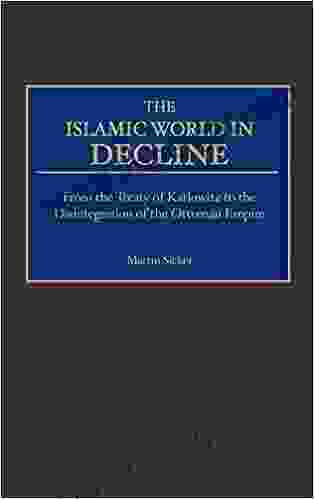From the Treaty of Karlowitz to the Disintegration of the Ottoman Empire

The Treaty of Karlowitz, signed in 1699, marked a turning point in the history of the Ottoman Empire. After centuries of expansion, the empire was now on the defensive, and the treaty ceded large territories to Austria, Venice, and Poland. This was the first major blow to Ottoman power, and it set the stage for the empire's eventual decline and disintegration.
There were a number of factors that contributed to the Ottoman Empire's decline. One factor was the rise of European powers. With the development of new technologies, such as firearms, the Europeans were able to gain a military advantage over the Ottomans. This advantage was further reinforced by the rise of nationalism in Europe. As the Ottoman Empire began to lose control of its European territories, nationalist movements emerged, and these movements eventually led to the independence of several Balkan states.
5 out of 5
| Language | : | English |
| File size | : | 2547 KB |
| Text-to-Speech | : | Enabled |
| Screen Reader | : | Supported |
| Word Wise | : | Enabled |
| Print length | : | 264 pages |
Another factor that contributed to the Ottoman Empire's decline was its failure to modernize. The empire's institutions were outdated, and its economy was stagnant. This made it difficult for the empire to compete with the more advanced European powers. In addition, the empire was plagued by corruption and inefficiency, which further weakened its position.
In the 19th century, the Ottoman Empire faced a series of challenges that further accelerated its decline. The Greek War of Independence (1821-1829) and the Russo-Turkish War (1877-1878) both resulted in the loss of territory to the Ottomans. In addition, the empire was forced to deal with the rise of nationalism in its own territories. This nationalism eventually led to the disintegration of the empire and the creation of several new nation-states, including Turkey, Iraq, and Syria.
The Treaty of Karlowitz marked the beginning of a long and difficult period for the Ottoman Empire. The empire was forced to cede territory to its European rivals, and it was unable to keep up with the pace of modernization. These factors contributed to the empire's eventual decline and disintegration.
The Balkan Wars and World War I
The Balkan Wars (1912-1913) were a series of conflicts between the Ottoman Empire and the Balkan states of Serbia, Bulgaria, Greece, and Montenegro. The wars resulted in the loss of almost all of the Ottoman Empire's remaining territories in the Balkans. This was a major blow to the empire, and it further weakened its position.
World War I (1914-1918) was the final nail in the coffin for the Ottoman Empire. The empire fought on the side of the Central Powers, and it was defeated in the war. As a result of the war, the empire was divided into several parts, and it lost control of its Middle Eastern territories. The empire was officially abolished in 1922, and the modern state of Turkey was founded in its place.
The Legacy of the Ottoman Empire
The Ottoman Empire was one of the largest and most powerful empires in history. It ruled over vast territories in Europe, Asia, and Africa for over six centuries. The empire's legacy is complex and multifaceted. On the one hand, the empire was responsible for the spread of Islam to many parts of the world. It also played a major role in the development of world trade and commerce. On the other hand, the empire was also responsible for a great deal of violence and oppression. Its rule was often arbitrary and capricious, and it was responsible for the deaths of millions of people.
The Ottoman Empire is a reminder of the rise and fall of empires. It is also a reminder of the importance of learning from the past. We must never forget the lessons that we can learn from the Ottoman Empire's history.
Further Reading
- Ottoman Empire (Encyclopædia Britannica)
- Ottoman Empire (History.com)
- Ottoman Empire (National Geographic)
5 out of 5
| Language | : | English |
| File size | : | 2547 KB |
| Text-to-Speech | : | Enabled |
| Screen Reader | : | Supported |
| Word Wise | : | Enabled |
| Print length | : | 264 pages |
Do you want to contribute by writing guest posts on this blog?
Please contact us and send us a resume of previous articles that you have written.
 Book
Book Novel
Novel Page
Page Chapter
Chapter Text
Text Story
Story Genre
Genre Reader
Reader Library
Library Paperback
Paperback E-book
E-book Magazine
Magazine Newspaper
Newspaper Paragraph
Paragraph Sentence
Sentence Bookmark
Bookmark Shelf
Shelf Glossary
Glossary Bibliography
Bibliography Foreword
Foreword Preface
Preface Synopsis
Synopsis Annotation
Annotation Footnote
Footnote Manuscript
Manuscript Scroll
Scroll Codex
Codex Tome
Tome Bestseller
Bestseller Classics
Classics Library card
Library card Narrative
Narrative Biography
Biography Autobiography
Autobiography Memoir
Memoir Reference
Reference Encyclopedia
Encyclopedia John Torres
John Torres Jane Miller
Jane Miller Richard Zeoli
Richard Zeoli Carrie Rohman
Carrie Rohman Donald B Bibeault
Donald B Bibeault Catherine Marshall
Catherine Marshall Carrie Nichole
Carrie Nichole Charissa Hughley Johnson
Charissa Hughley Johnson Charles Berlitz
Charles Berlitz Carolyn Sophia Skowron
Carolyn Sophia Skowron Roto Solo
Roto Solo Crispin Sartwell
Crispin Sartwell Catherine E Walsh
Catherine E Walsh Carol D Tamparo
Carol D Tamparo Carmen Martinez Jover
Carmen Martinez Jover Chandre Dharma Wardana
Chandre Dharma Wardana Cedar Rose Guelberth
Cedar Rose Guelberth Carol Caico
Carol Caico Charles Darwin
Charles Darwin Rohan O Grady
Rohan O Grady
Light bulbAdvertise smarter! Our strategic ad space ensures maximum exposure. Reserve your spot today!
 Andy ColeFollow ·11.5k
Andy ColeFollow ·11.5k Derek CookFollow ·16.2k
Derek CookFollow ·16.2k Douglas FosterFollow ·11.2k
Douglas FosterFollow ·11.2k Bradley DixonFollow ·19.7k
Bradley DixonFollow ·19.7k Mike HayesFollow ·18.2k
Mike HayesFollow ·18.2k Jeremy MitchellFollow ·8.2k
Jeremy MitchellFollow ·8.2k Robert ReedFollow ·2k
Robert ReedFollow ·2k Stan WardFollow ·16.5k
Stan WardFollow ·16.5k

 Henry Hayes
Henry HayesVery Short Introductions: A Gateway to Knowledge...
In the realm of academia, where vast oceans of...

 Jean Blair
Jean BlairBorn on the Third of July: An Unforgettable Journey of...
Born on the Third...

 Benjamin Stone
Benjamin StoneEnvironmental Offsets: Striking a Balance between...
In the face of pressing environmental...

 Colin Foster
Colin FosterGirl With Power: My Boyhood Bully Diary
In this gripping and...

 Colin Foster
Colin FosterUnveiling the Unseen: The Collected Works of Charles Fort
Prepare to venture into...

 Gabriel Mistral
Gabriel MistralUnveiling the Hidden World of the English Republican...
Dive into the captivating world of 'The...
5 out of 5
| Language | : | English |
| File size | : | 2547 KB |
| Text-to-Speech | : | Enabled |
| Screen Reader | : | Supported |
| Word Wise | : | Enabled |
| Print length | : | 264 pages |












